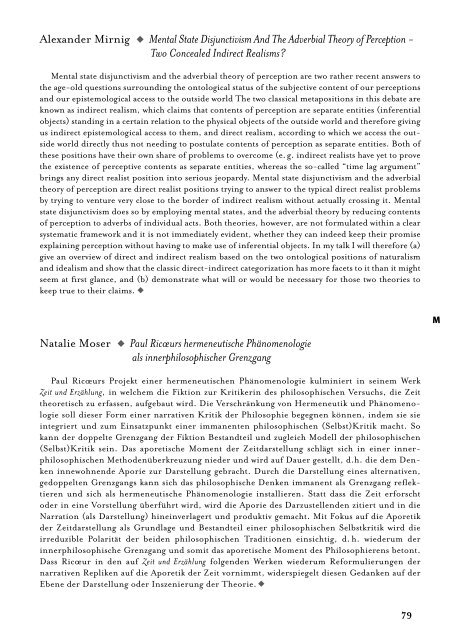Verlag.Buchhandel.Service. - Österreichische Gesellschaft für ...
Verlag.Buchhandel.Service. - Österreichische Gesellschaft für ...
Verlag.Buchhandel.Service. - Österreichische Gesellschaft für ...
Sie wollen auch ein ePaper? Erhöhen Sie die Reichweite Ihrer Titel.
YUMPU macht aus Druck-PDFs automatisch weboptimierte ePaper, die Google liebt.
Alexander Mirnig ◆ Mental State Disjunctivism And The Adverbial Theory of Perception -<br />
Two Concealed Indirect Realisms?<br />
Mental state disjunctivism and the adverbial theory of perception are two rather recent answers to<br />
the age-old questions surrounding the ontological status of the subjective content of our perceptions<br />
and our epistemological access to the outside world The two classical metapositions in this debate are<br />
known as indirect realism, which claims that contents of perception are separate entities (inferential<br />
objects) standing in a certain relation to the physical objects of the outside world and therefore giving<br />
us indirect epistemological access to them, and direct realism, according to which we access the outside<br />
world directly thus not needing to postulate contents of perception as separate entities. Both of<br />
these positions have their own share of problems to overcome (e. g. indirect realists have yet to prove<br />
the existence of perceptive contents as separate entities, whereas the so-called “time lag argument”<br />
brings any direct realist position into serious jeopardy. Mental state disjunctivism and the adverbial<br />
theory of perception are direct realist positions trying to answer to the typical direct realist problems<br />
by trying to venture very close to the border of indirect realism without actually crossing it. Mental<br />
state disjunctivism does so by employing mental states, and the adverbial theory by reducing contents<br />
of perception to adverbs of individual acts. Both theories, however, are not formulated within a clear<br />
systematic framework and it is not immediately evident, whether they can indeed keep their promise<br />
explaining perception without having to make use of inferential objects. In my talk I will therefore (a)<br />
give an overview of direct and indirect realism based on the two ontological positions of naturalism<br />
and idealism and show that the classic direct-indirect categorization has more facets to it than it might<br />
seem at first glance, and (b) demonstrate what will or would be necessary for those two theories to<br />
keep true to their claims. ◆<br />
Natalie Moser ◆ Paul Ricœurs hermeneutische Phänomenologie<br />
als innerphilosophischer Grenzgang<br />
Paul Ricœurs Projekt einer hermeneutischen Phänomenologie kulminiert in seinem Werk<br />
Zeit und Erzählung, in welchem die Fiktion zur Kritikerin des philosophischen Versuchs, die Zeit<br />
theoretisch zu erfassen, aufgebaut wird. Die Verschränkung von Hermeneutik und Phänomenologie<br />
soll dieser Form einer narrativen Kritik der Philosophie begegnen können, indem sie sie<br />
integriert und zum Einsatzpunkt einer immanenten philosophischen (Selbst)Kritik macht. So<br />
kann der doppelte Grenzgang der Fiktion Bestandteil und zugleich Modell der philosophischen<br />
(Selbst)Kritik sein. Das aporetische Moment der Zeitdarstellung schlägt sich in einer innerphilosophischen<br />
Methodenüberkreuzung nieder und wird auf Dauer gestellt, d.h. die dem Denken<br />
innewohnende Aporie zur Darstellung gebracht. Durch die Darstellung eines alternativen,<br />
gedoppelten Grenzgangs kann sich das philosophische Denken immanent als Grenzgang reflektieren<br />
und sich als hermeneutische Phänomenologie installieren. Statt dass die Zeit erforscht<br />
oder in eine Vorstellung überführt wird, wird die Aporie des Darzustellenden zitiert und in die<br />
Narration (als Darstellung) hineinverlagert und produktiv gemacht. Mit Fokus auf die Aporetik<br />
der Zeitdarstellung als Grundlage und Bestandteil einer philosophischen Selbstkritik wird die<br />
irreduzible Polarität der beiden philosophischen Traditionen einsichtig, d. h. wiederum der<br />
innerphilosophische Grenzgang und somit das aporetische Moment des Philosophierens betont.<br />
Dass Ricœur in den auf Zeit und Erzählung folgenden Werken wiederum Reformulierungen der<br />
narrativen Repliken auf die Aporetik der Zeit vornimmt, widerspiegelt diesen Gedanken auf der<br />
Ebene der Darstellung oder Inszenierung der Theorie. ◆<br />
79<br />
M


